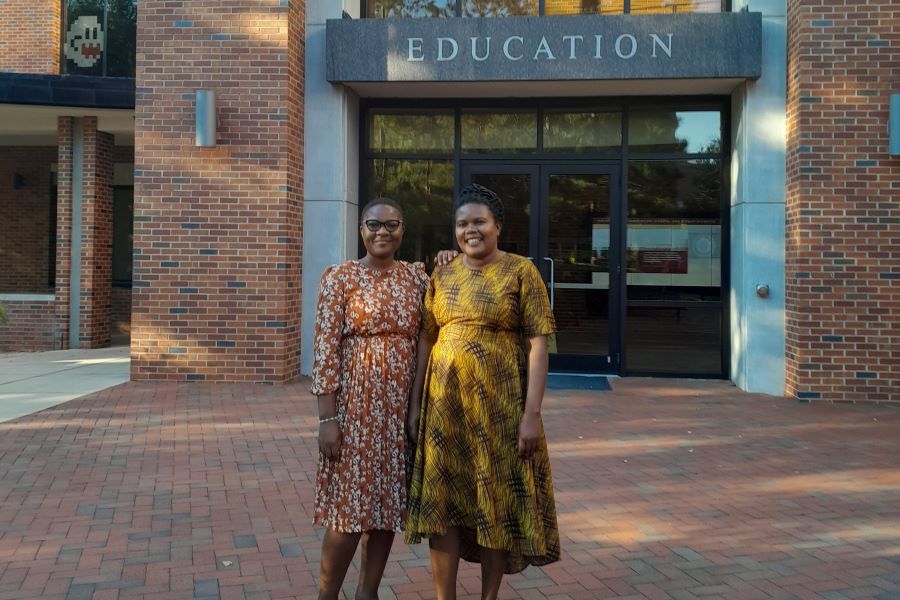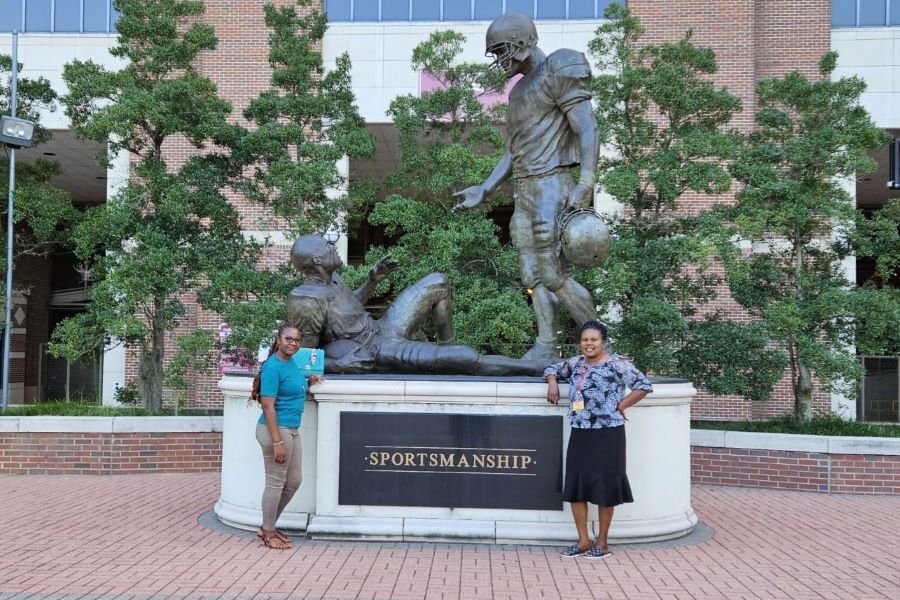
Florida State University’s Learning Systems Institute (LSI) hosted two teacher educators from Zambia last fall in its continuing efforts to improve teaching and learning around the world.
The semester-long residency is a key component to the long-term success of the Transforming Teacher Education Activity (TTE) in Zambia, which is led by LSI and sponsored by the U.S. Agency for International Development (USAID). This multifaceted activity aims to strengthen the capacity of Zambia’s pre-service teacher training institutions to improve student learning outcomes.
This past fall, LSI hosted Namushi Situtu, senior college lecturer of literacy and languages education with the Ministry of Education in Zambia, and Sandra Mulesu, a college lecturer at the Zambia Institute of Special Education.
While here, Situtu and Mulesu delved into the academic environment, dedicating themselves to expanding their knowledge and excelling in four graduate-level courses.
“The biggest takeaway is the different way of presenting information to the students, such as the different methodologies, and the hands-on aspect of teaching,” Mulesu said.
“The learner-centeredness is something we are taking home with us. Learners being involved from the start of the lesson up to the end is important and enhances their understanding.”
— Sandra Mulesu, a college lecturer at the Zambia Institute of Special Education
Zambia is a landlocked country in southern Africa with incredible wildlife, national parks and safari areas. One of the biggest reasons people travel to Zambia is to see Victoria Falls, a UNESCO World Heritage site that sits on the border with Zimbabwe. According to USAID, the education system in Zambia is challenged by inadequate resources, poor quality of education delivery and low secondary progression rates.
Despite significant investments in early-grade literacy in Zambia, pre-service teacher education has been excluded from previous development programs. The TTE project connects teacher training with the evidence-based practices already used in Zambian primary schools, ensuring that teachers enter the classroom prepared to help children learn how to read and to provide safe learning environments.
The TTE project is already yielding transformative results, with teacher educators striving to improve their teaching practices with the aim of creating a chain reaction that strengthens Zambia’s entire education system.
“We learned methods for helping our learners have more of an interest in reading,” Situtu said. “At FSU, we noticed our teachers gave us readings to complete before the next lesson. Everyone is supposed to go through the readings and ask questions based on them. I think that is a strategy we will extend to our students to help their reading skills.”
Prior to TTE, there was no formal training for those who were promoted to teacher educators in Zambia. TTE is addressing this issue by providing support for teacher educators, so they can properly nurture upcoming primary and secondary school teachers.

“The teacher education program has helped all of us back home because TTE has provided excellent resources and walked us through how to use them,” Mulesu said. “They’ve trained us on how to teach that material and helped us with different methodologies. When others come on board, they will be able to observe from us because they’ve now set a standard for how we can best deliver this material, and we are integrating the information across all the colleges of education.”
The project is also building relationships between teaching colleges, universities and primary schools. These connections will give teachers-in-training opportunities to practice their skills and provide settings where lecturers can conduct participatory action research about early-grade reading.
“Transforming Teacher Education has really helped, especially with the aspect of inclusivity because all the lecturers are being trained in teaching literacy and languages,” Situtu said. “TTE makes sure everyone gets firsthand information. The cooperation of this program with us as fellows is another milestone.”
Mulesu and Situtu are excited to return to Zambia to put their newly acquired skills into classroom practice.
“The learner-centeredness is something we are taking home with us,” Situtu said. “Learners being involved from the start of the lesson up to the end is important and enhances their understanding.”
Mulesu and Situtu believe in the power of leading by example and are committed to equipping future teachers with the tools necessary for their students to succeed.
“We intend to share this knowledge of differentiated instruction with our fellow lecturers in our continuous professional development so that we see how best we can attend to the needs of different students and their levels of understanding materials,” Mulesu said.
Both Mulesu and Situtu emphasized the large-scale effects TTE is making on Zambia’s education system.
“We anticipate having better teachers with better methodologies for teaching literacy and language,” Mulesu said. “The impact cannot be underestimated for this project.”
LSI has been at the forefront of developing innovative solutions that bridge theory and practice in education. For over 50 years, LSI has delivered systems that measurably improve the learning and performance of organizations and individuals here in Florida and globally. To learn more about LSI, visit lsi.fsu.edu.



